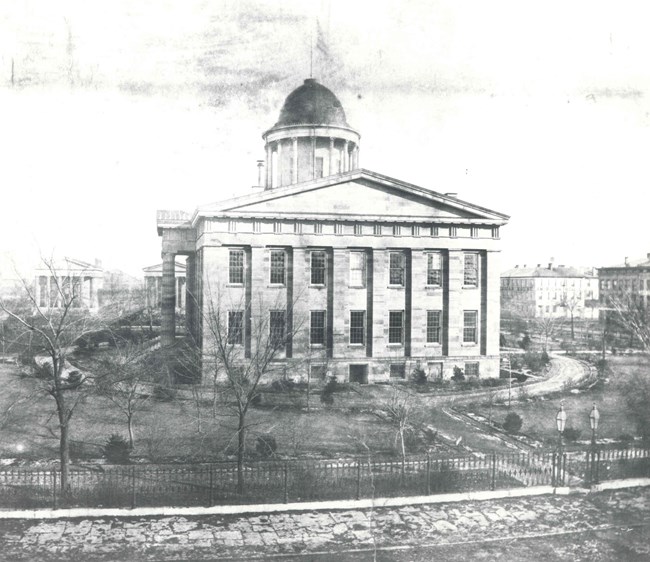
Abraham Lincoln Presidential Library & Museum The Lincolns loved their children and indulged them greatly. Mary paraded their accomplishments before visitors, gave them elaborate birthday parties and often joined in their games, throwing dignity to the wind. Lincoln often took the two youngest to his law office and let them run wild while he worked. William Herndon, a law partner and biographer of Lincoln, frequently grew so mad that he wanted to throw the boys out the window. He dared not say anything, for he knew that Lincoln would side with the boys. In the spring of 1854 Lincoln returned to politics. The spur was Sen. Stephen Douglas's Kansas-Nebraska Act which repealed the Missouri Compromise that prohibited slavery north of 36° 30' N. latitude, Missouri's southern border. Lincoln and many of his fellow Whigs opposed the new law and in the upcoming elections that fall sought to bolster their strength in the Congress and the State legislatures. Consequently, Lincoln's reputation grew. In 1855, Lincoln ran for the U.S. Senate but lost. One year later, at the first Republican national convention in Philadelphia, the Illinois delegation nominated him for vice president. He lost again but more and more people were beginning to recognize his name. In 1858 Senator Douglas came up for reelection. On June 16, the State Republican Convention nominated Lincoln for the seat. In his acceptance speech at the State Capitol, Lincoln set the tone of the campaign when he said, "'A house divided against itself cannot stand!' I believe this government cannot endure permanently half slave and half free." On the advice of his managers, Lincoln challenged Douglas to a series of 7 debates during the fall of 1858. Douglas was reluctant, but finally accepted. The famous Lincoln-Douglas debates ensued. These debates helped make Lincoln a national figure. His logic, moral fervor, spare and elegant language, and skillful debating techniques diminished Douglas' reputation. Douglas found himself backed into a corner before he realized what had happened. Douglas lost the debates but won the election. Lincoln continued to give speeches, many in support of the Republican party, throughout the Midwest. In October of 1859 he was invited to speak in the East. His speech to the Young Men's Central Republican Union of New York City at Cooper Union on February 27, 1860, brought him to the attention of influential Republicans in the Northeast. He exhorted his audience to compromise readily if the occasion arose but not to shrink from their opposition to the extension of slavery. "Let us have faith that right makes might, and in that faith let us, to the end, dare to do our duty as we understand it," were the words Lincoln left ringing in their ears. At the 1860 Republican convention in Chicago, William H. Seward of New York, Salmon P. Chase of Ohio, and Simon Cameron of Pennsylvania were the leading contenders for the party's presidential nomination. But Lincoln was a new man and had few opponents. Through the political astuteness of his managers and his own shrewd politicking he got the nomination on May 16, 1860. Hannibal Hamlin of Maine was selected as his running mate. Lincoln learned of the nominations by telegram in Springfield. Beaming, he shook hands all around and went home to tell Mary the news. That night Springfield went wild. In the general election, Lincoln faced Stephen Douglas, John Breckinridge, and John Bell. Lincoln spent most of the election day at his office and then went to vote around mid-afternoon. Before the night was over, the outcome of the balloting was certain. Lincoln took only 40 percent of the popular vote, but he received a clear majority of the electoral vote. On January 27, 1861, Lincoln announced that he would depart for Washington on February 11 and asked for the "utmost privacy" during the rest of his stay in Springfield. Much had to be done before the departure. The house on Eighth Street, with all its memories, had to be vacated and some household articles sold. Lucian Tilton, president of the Great Western Railroad, bought some of the furniture. In 1869 Tilton moved to Chicago and 2 years later the Great Chicago Fire destroyed his home and some of the Lincoln furniture. Many personal possessions were packed for use in the White House. Lincoln himself roped the trunks and put a card on each one labeled "A. Lincoln, White House, Washington, D.C." And Lincoln also needed some privacy to think about the awesome job that lay ahead of him. Already six States had left the Union and another, Texas, would join them before he left Springfield. Grave times faced him. On the rainswept morning of February 11, 1861, Lincoln stood on the Springfield train platform. In a voice trembling with emotion he addressed the crowd. My friends-No one, not in my situation, can appreciate my feeling of sadness at this parting. To this place, and the kindness of these people, I owe every thing. Here I have lived a quarter of a century and have passed from a young to an old man. Here my children have been born and one is buried. I now leave, not knowing when, or whether ever, I may return, with a task before me greater than that which rested upon Washington. Without the assistance of that Divine Being who ever attended him I cannot succeed. With that assistance I cannot fail. Trusting in Him, who can go with me, and remain with you and be every where for good, let us confidently hope that all will yet be well. To His care commending you, as l hope in your prayers you will commend me I bid you an affectionate farewell. |
Last updated: April 10, 2015
